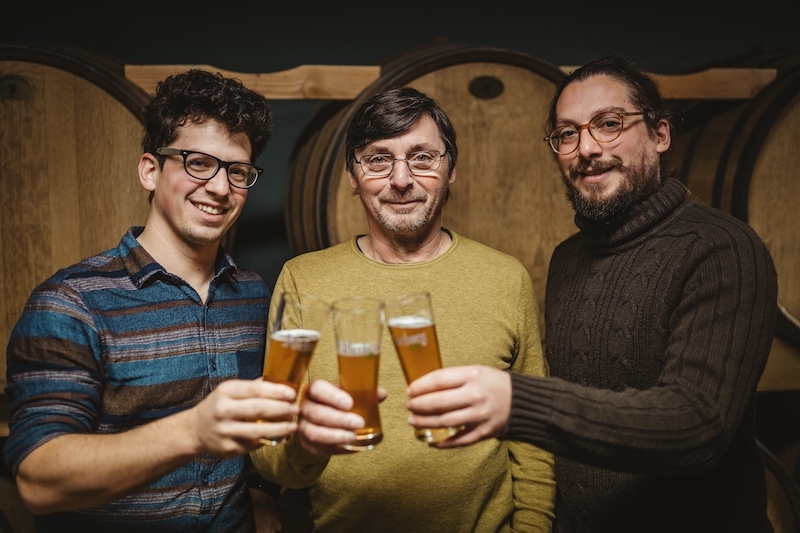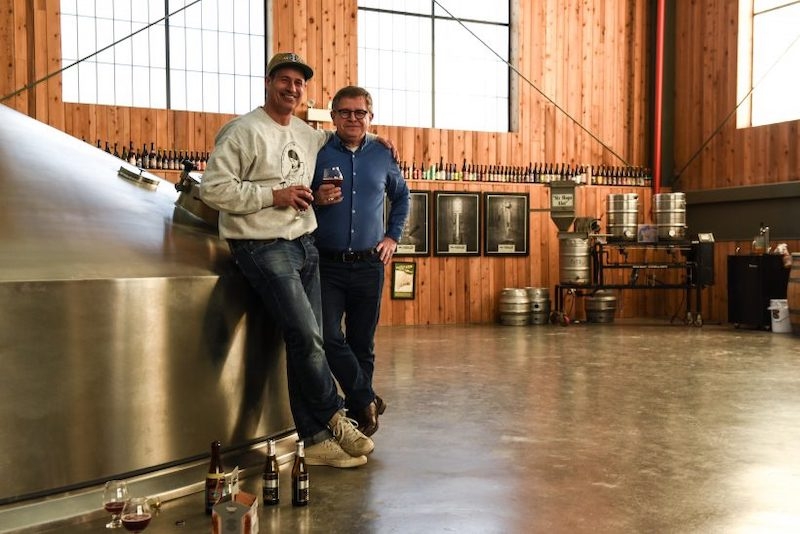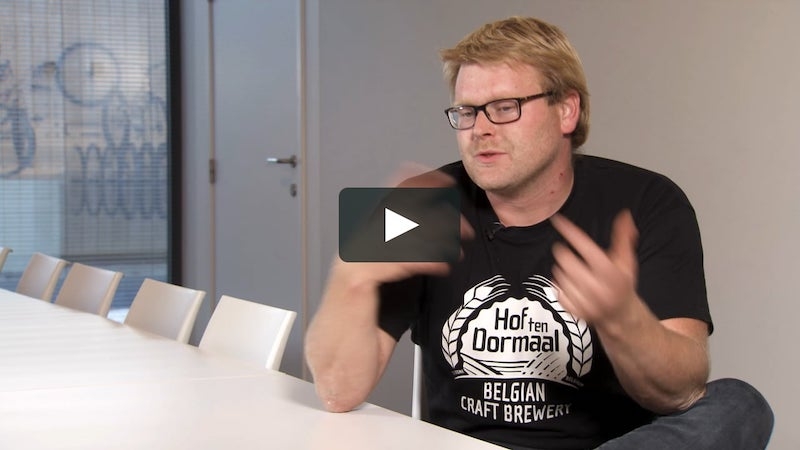The streets of Brussels were busy during the short Winter days. In January, more than 10,000 students skipped school to join marches demanding better protections for the globe’s climate. Many of the schools have shown understanding for the no-shows, an emboldened momentum having developed among the country’s youth relating to the issue.
In December, the streets of Brussels hosted a different protest, this one against the UN’s global plans for safe, orderly and regular migration, signed by 164 countries in Marrakech earlier this month but with notable absentees on the signature page including the US, Hungary, Poland, Austria and Slovakia. Counter protesters in Brussels who supported the migration pact described those marching as fascist groups. The dispute resulted in the Belgian Prime Minister, Charles Michel, resigning his position.
For those seeking equally large gatherings with good beer, similar drama but with quirkier hats, there was the Kerstbierfestival in Essen, a festival showcasing only Christmas beers, and the Bruges Beer Festival, an event which took place in Bruge’s main squares and belfry for the last time due to concerns expressed by Stad Brugge about its aesthetic impact on the city.
The Winter in Belgium saw beer burglars, Lambic departures, the announcement of a unique collaboration and some noteworthy arrivals. Here’s a round-up of everything that happened in Belgian beer during the Winter of 2018 / 2019:
1. INSTRUMENTAL
Last year, Brouwerij Den Herberg released its first spontaneously fermented beer. Curious visitors from Lambic breweries passed by, including Armand Debelder of Brouwerij Drie Fonteinen, Gert Christiaens of Geuzestekerij Oud Beersel, Frank Boon of Brouwerij Boon and Willem Van Herreweghen of Brouwerij Timmermans. The media attended a press launch at Den Herberg to try the beer from 5 litre bags-in-a-box that the brewery had prepared.
Photo © Cliff Lucas
Lambic, like music, requires years of dedication and a consuming passion. In the most recent winter edition of Belgian Beer and Food Magazine, I met the musicians and brewers of the Devillé family who have become the latest Payottenland Lambic brewers.
Read more here: https://belgianbeerandfood.com/magazine-articles/instrumental
2. THE BELGIAN BEER BURGLAR
A beer thief was twice left hanging upside down from a spiked fence during a raid on a supermarket loading dock on Sunday 16 December. The thief hung in the precarious position for hours until passers-by who encountered him in the early morning called the police.
The incident happened at a Spar Craeghs supermarket in Kaulille, in the Belgian province of Limburg.
After his first raid at 3am, the burglar was freed from the fence by passers-by, only to return at 5am to steal for a second time.
In attempting to steal a crate of Duvel beer, he got stuck on the gate while trying to climb back outside. He tried to free himself by taking his trousers off. This didn’t work.
The 30-year-old thief, who cannot be named for legal reasons, was already known to police because of a previous criminal record.
Read more here: https://sputniknews.com/videoclub/201812211070912455-belgian-beer-burglar-snagged-fence/
3. HORAL DEPARTURES
The next General Assembly of HORAL—the High Council for Artisanal Lambic Beers—is expecting to see the formal withdrawal from the organisation of two of its 15 members, Girardin and 3 Fonteinen.
Rumours were confirmed to Belgian Beer and Food Magazine by Frank Boon, the current HORAL Chairperson.
Alan Hope reports: [Werner Van Obberghen of 3 Fonteinen said that the brewery and blendery “can no longer find itself” in the values and direction of HORAL, although he didn’t wish to elaborate on why they were leaving.]
Read more here: https://belgianbeerandfood.com/articles/3-fonteinen-and-girardin-set-to-quit-lambic-producers-association-horal
4. RODENBACH’S FIRST EVER COLLABORATION TO BE WITH DOGFISH HEAD
For the first time in its nearly 200-year history, Brouwerij Rodenbach—the Roeselare brewery famous for its south west Flemish red brown beers of mixed fermentation—will produce a beer in partnership with another brewery: Dogfish Head of Milton, Delware, USA.
The recipe hasn’t yet been decided but the beer is expected to be available for purchase in 2020.
Beer Advocate reports that the collaboration was born from a conversation at the 2018 Craft Brewers Conference between Rudi Ghequire of Rodenbach and Bill Marchi, Head of Dogfish Head’s wild beer and barrel-aged program.
Read more here: https://www.beeradvocate.com/articles/17895/rodenbach-and-dogfish-head-to-produce-first-collaboration-in-famed-belgian-brewerys-history/
If you think anything else relating to the world of Belgian beer is worthy of inclusion, let us know so we can include in our next round-up.
5. DUVEL BUYS KOMBUCHA
Family-owned Belgian brewery Duvel Moortgat bought a majority stake in an east London-based Kombucha brand.
JARR Kombucha, a fermented tea hand-bottled in Hackney Wick, was first launched in 2015 by Adam Vanni, Tom and Jess Seaton, and Neil Hinchley, and has gained listings in bars, restaurants and cafes across the country such as Soho House, Selfridges, Planet Organic, Harrods and Sourced Market.
Edith Hancock reports for The Drinks Business Magazine that the new partnership with Duvel Moortgat—in which Duvel now owns 60% of the Kombucha business—[will allow JARR to “significantly increase production,” according to an emailed statement’.] The company will continue to be run by the JARR founders.
Read more here: https://www.thedrinksbusiness.com/2018/11/duvel-moortgat-acquires-kombucha-brand/
6. HOP LAMPS FOR HOF TEN DORMAAL
Farm brewery Hof ten Dormaal from Tildonk are one of the ten “laureates” of the Agricultural Innovation Campaign 2018 for their hop growing under LED lamps. Their initiative was selected from a total of 122 candidates who submitted agricultural projects.
Brewer and farmer Dries Janssens is working on the cultivation of hops in greenhouses with LED lighting. In this way he hopes to be able to harvest more often, and also at times when it is not possible outside due to climate.
[“Theoretically, hops should be allowed to grow under LED lights,” says Janssens. “Only that has not been tested so far. We have built a conservatory and are now going to see what the result is of hop growing under artificial light.”]
Read more here: https://www.innovatiesteunpunt.be/nl/inspiratie/winnaar-innovatiecampagne-2018-8
7. WINTER TAKEOVERS
There were some high-profile takeovers during the winter months. Swinkels Family Brewers—who own Rodenbach and Palm—took a 100% stake in Dutch brewery De Molen after having bought 35% in 2016 (more here). ZX Ventures, the venture capital arm of the world’s largest beer company Anheuser-Busch InBev, acquired the remaining portion of beer ratings website RateBeer.com that it did not already own (more here).
Perhaps the most important take-over for the world of Belgian beer, however, was that of a maltery. On 20 December 2018, Cargill and Axéréal announced their intention to enter into an agreement under which Cargill will sell its malt business to Axéréal’s malt subsidiary, Boortmalt. The transaction involves the global malt business, including 15 facilities across four continents, representing more than 500 people.
Axereal is one of France’s foremost cereals cooperative groups specialising in growing and processing cereals for the brewing, baking and livestock industries. Axereal has 13,000 cooperative members and 3,200 employees. It generates turnover of around €3 billion per year and operates in 13 countries.
This transaction would give Boortmalt access to a global footprint and offer further growth opportunities for Cargill’s Malt business and its people.
Read more here: https://www.prnewswire.com/news-releases/axereal-to-acquire-cargills-malt-business-300769536.html
8. COMINGS, GOINGS, NEW BEERS AND BIRTHDAYS
Among the more exciting new brewery openings during the winter was Brasserie Atrium, operating out of a small facility in Marche-en-Famenne.
Atrium are: Valéry De Breucker, formerly brewing at Brasserie Fantome and then Brasserie Du Clocher; and Paula Yunes, originally from São Paulo in Brazil and having more recently brewed in Belgium with Brasserie Les Fleurs du Malt in Huy.
Kortrijk gets its newest city brewery in the coming months with the opening of Brouwerij Ruimtegist (the name translating as “Space Yeast”), currently crowdfunding before launching in an old bakery behind well-known café, De Dingen (“The Things”), itself having recently undergone a renovation.
The people behind the brewery are: Arn Simoens, a journalist and sales manager; and Egbert ‘Benny’ Glorieux, a project coordinator for a large water utility company. Simoens and Glorieux are school friends and studied brewing together at CVO Panta Rhei in Ghent, developing recipes and their business plan over the last three years.
The Tongeren brewery, Brouwerij Amburon—which produces the Amburon and Tungri beers—has been declared bankrupt. Reports in Het Laatse Nieuws state that a dispute between the three founders contributed to the bankruptcy (read more).
The St. Bernardus brewery in Watou launched a new web shop. It’s part of a bigger expansion in the brewery’s infrastructure and staffing, with a 7% increase in sales of beer from Watou last year (read more).
There were new beers in Belgium. Brouwerij De Ranke launched their Franc Belge, a house beer for the Spéciale Belge bar in Antwerp. It’s a quirky Spéciale Belge, an amber-coloured beer with a good balance of malt character and the signature De Ranke bitterness.
Slaapmutske launched the Jan Van Oudenaarde Glutenfree Tripel, a beer which Danny De Smet says is “brewed traditionally and then deglutinezed during lagering.”
In other news, Brouwerij Ter Dolen turned 25 years old, having opened its gates to the public for the first time on 9 July 1994. During the year, the brewery is organising events and festivities to celebrate the anniversary (more here).
“PORTIE GEMENGD”
→ “We always brew what we want to brew”—Eoghan Walsh takes a look at the history of Brasserie De La Senne in 5 beers: https://www.beercity.brussels/home/2019/a-history-of-brasserie-de-la-senne-in-5-beers
→ Duvel’s Scottish Origins—Katrien Bruyland reports on a Caledonian connection with the Mortgat family and describes the evolution of World War One ‘Victory Ale’ into the ‘Duvel’ we know today: https://www.originalgravitymag.com/duvels-scottish-origins/
→The Male Gueuze —Lily Waite explores Cantillon, Cabaret, and Context for Good Beer Hunting, with beautiful graphics by Cooper Foszcz: https://www.goodbeerhunting.com/blog/2018/12/26/the-male-gueuze-cantillon-cabaret-and-context
→One More For the Road —Joe Stange sits down with Zach Johnston of UPROXX to talk about the must-see places on your visit to Belgium’s capital: https://www.thirstypilgrim.com/2018/12/one-more-road-for-beer-brussels.html
→Sensory Beer Book—A new book called Belgian Beer, Tested and Tasted claims to be “the ultimate successor to Michael Jackson’s beer book with accessible info graphs and diagrams to test your favourite Belgian beer and taste pattern, nicely bundled in a handy guide”. For two years, the Flemish Institute for Biotechnology subjected 250 different Belgian beers to thorough chemical analyses and an objective panel of scientific guinea pigs: https://www.lannoo.be/en/belgian-beer
→De Engel Closes—The Lagrou family made the difficult decision of closing the well-known Gits bar De Engel (The Angel) after the hospitalisation of owner Frank Lagrou, who celebrated his 90th birthday in the café on 9 December 2018 after 73 years as the face of De Engel, largely regarded as the oldest café owner in Belgium: Read more here.
If you think anything else relating to the world of Belgian beer is worthy of inclusion, let us know so we can include in our next round-up.
Tot de volgende keer. À bientôt . Slán go fóill.






